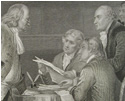
 John
Adams returns to Philadelphia to represent Massachusetts at the Philadelphia
Congress in 1776. He spends most of the year there working to create the
political harmony needed to make the Declaration of Independence possible.
Laboring tirelessly for the cause of independence, he serves on many committees,
chairing a number of them. After a brief visit to his home in Braintree,
Adams returns to Philadelphia early in 1777, overcoming the extreme difficulties
of overland travel in mid-winter to do critical work for his newly born
nation.
John
Adams returns to Philadelphia to represent Massachusetts at the Philadelphia
Congress in 1776. He spends most of the year there working to create the
political harmony needed to make the Declaration of Independence possible.
Laboring tirelessly for the cause of independence, he serves on many committees,
chairing a number of them. After a brief visit to his home in Braintree,
Adams returns to Philadelphia early in 1777, overcoming the extreme difficulties
of overland travel in mid-winter to do critical work for his newly born
nation.
 In
the meantime, his wife and young family suffer the hardships of war. Shortages,
inflation, disease, and the fear of both the British army and navy constantly
loom over his wife Abigail and their four children. Adding to Adams's
concern is his wife's pregnancy.
In
the meantime, his wife and young family suffer the hardships of war. Shortages,
inflation, disease, and the fear of both the British army and navy constantly
loom over his wife Abigail and their four children. Adding to Adams's
concern is his wife's pregnancy.
John Adams is keenly aware that his oldest son, John Quincy, is coming
into his formative years, a time when his education is supremely important.
His letters address his concerns at this most unusual time for Massachusetts
and the other colonies.
• "Drafting the Declaration of Independence." Engraving, 1857, after the original painting by Chappel. Published in James Parton's "The Life and Times of Benjamin Franklin," extra-illustrated edition, pt. 4 (Boston: Curtis Guild, 1881). Guild Library, Massachusetts Historical Society.
• Birthplaces of John Adams and John Quincy Adams. Watercolor and graphite on paper by Eliza Susan Quincy, 1822. In her "Memoir." Quincy Family Papers, Massachusetts Historical Society.